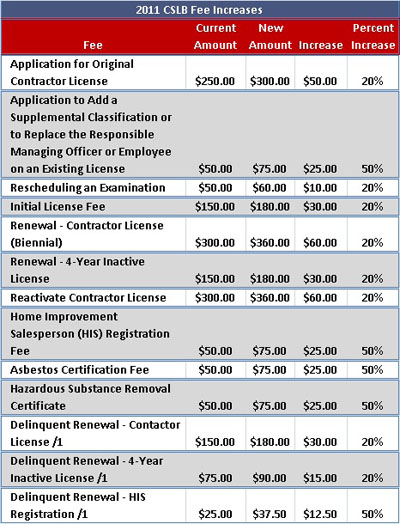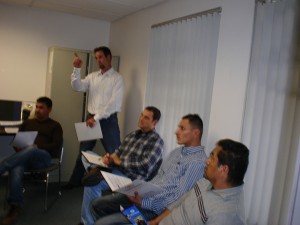
SACRAMENTO — New California construction laws and regulations passed during the 2009-2010 legislative session take effect January 1, 2011.
A key consumer protection law regarding mechanics liens (a claim on property that could force its foreclosure and sale to satisfy unpaid contractor or supplier debts) becomes effective on January 1, 2011. The result of Contractors State License Board (CSLB)-sponsored Assembly Bill 457 (Monning), the new law, signed in 2009, requires contractors, subcontractors or materials suppliers who intend to file a mechanics lien to serve aNotice of Mechanics Lien on the property owner. In addition to the notice, the person serving the mechanics lien must also provide a proof of service affidavit or the lien will be unenforceable. Mechanics liens are recorded with the county. Many times homeowners are unaware that a lien has even been placed on their property. Awareness of a lien is important because even if a mechanics lien is not used to foreclose on the property, its presence on the title can potentially prevent borrowing against, refinancing or selling the property.
“AB 457 provides vital protection for California property owners, plus, CSLB provides many resources and tips that consumers can easily review before a construction contract is signed to avoid the possibility of a mechanics lien altogether,” said CSLB Registrar Steve Sands
A CSLB-sponsored bill passed this year provides a valuable tool to help combat the states underground economy. Senate Bill 1254 (Leno) will enable CSLB to issue a stop work order to any licensed or unlicensed contractor who fails to carry workers compensation insurance coverage for all of his or her employees. The new law gives CSLB unprecedented authority in allowing the Boards enforcement representatives to more effectively stop unlicensed, uninsured activity, and aid in the states efforts to ensure a level playing field for licensees who follow workers compensation laws. A stop order takes effect immediately and can be appealed. Employees who lose pay due to a work stoppage will be entitled to up to 10 days pay for time lost. Failure to comply with a stop work order will be a misdemeanor, punishable by up to 60 days in jail and/or a fine of up to $10,000.
Following are additional construction-related laws that take effect January 1, 2011, unless otherwise noted:
Other Workers Compensation
SB 313 (DeSaulnier) Labor Code Section 3722 amended
This bill, signed in 2009, increases the potential penalty for failure to have a workers compensation policy from $1,000 to $1,500 for each employee not covered. Fines are administered by the director of the Department of Industrial Relations. (Amended Stats 2009 ch 640 § 1)
AB 2305 (Knight) Business and Professions Code Section 7125 and Insurance Code Section 11665 amended
The bill extends the requirement for C-39 Roofing contractors to carry a workers compensation policy, even if he or she has no employees until 2013. (Amended Stats 2010 ch 423 §1, 2 and 3)
Environmental
AB 1343 (Huffman) Public Resources Code Chapter 5 added to Part 7, Division 30
Effective April 1, 2012, contractor outreach and education will begin regarding recycling of architectural paint. Implementation of this recycling program could include an assessment on the future sale of paint. (Amended Stats 2010 ch 420 § 1 and 2)
AB 2398 (John A. PÃrez) Public Resources Code Section Chapter 20 added to Part 3, Division 30 and Section 42980 repealed
Beginning on July 1, 2011, carpet manufacturers must charge an additional one-half cent sales tax per square yard of product purchased to pay for a carpet recycling program. (Amended Stats 2010 ch 681 § 1 and 2)
Criminal
AB 2372 (Ammiano) Penal Code Section 487 amended
This law changes the threshold from $400 to $950 to charge the crime of grand theft for stealing money, labor, real or personal property. (Amended Stats 2010 ch 693 § 1 and 2)
CSLB/Consumer Protection Boards
SB 294 (Negrete McLeod) Business and Professions Code Sections 7000.5 and 7011 amended
This bill extends CSLBs existence as a consumer protection board from January 1, 2011 to January 1, 2012. (Amended Stats 2010 ch 695 §37 and 38)
SB 392 (Florez) Business and Professions Code Sections 7025, 7028.5, 7029, 7065, 7065.1, 7065.5, 7068, 7068.1, ;7068.2, 7069, 7071, 7071.1, 7071.8, 7071.9, 7071.11, 7071.17, 7072.5, 7075.1, 7076, 7076.2, 7085.6, 7090, 7090.1, 7096, 7121, 7121.1, 7121.5, 7121.6, 7122, 7122.1, 7122.2, 7122.5, 7137, 7138, 7152, 7159 and 7159.10 and 7071.6.5 and 7071.19 added; Corporations Code Section 22037amended
This bill authorizes the issuance of a contractor license to a Limited Liability Corporation (LLC) beginning January 1, 2012. Prior to passage of this law, LLCs were not able to be licensed in California. The LLC would be required to maintain liability insurance of between $1,000,000 and $5,000,000 and post a $100,000 surety bond, in addition to the $12,500 bond already required of all licensees. (Amended Stats 2010 ch 698 §1 through 43)
SB 1491 (Committee on Business, Professions and Economic Development) Business and Professions Code Sections 7028.6, 7028.7, 7028.9 and 7058.5 amended
This bill requires that a citation for acting as a contractor or salesperson without a license or registration be issued within four years, or 18 months of a complaint for the violation, whichever is later. The bill also allows for contractors applying for an original license to complete and return the required open book exam about asbestos electronically. (Amended Stats 2010 ch 415 §17,18 and 19)
AB 1659 (Huber) Government Code Section 9147.7 added
This law abolishes the Joint Committee on Boards, Commissions and Consumer Protection and replaces it with the Joint Sunset Review Committee. CSLBs sunset review process remains unchanged. (Amended Stats 2010 ch 666 § 1)
AB 2130 (Huber) Business and Professions Code Section 22 amended and Section 101.1 and Division 1.2 repealed
This law is a companion bill to AB 1659, replacing the Joint Committee on Boards, Commissions and Consumer Protection and replacing it with the Joint Sunset Review Committee. (Amended Stats 2010 ch 670 § 1 through 3)
AB 2500 (Hagman) Business and Professions Code Section 114 amended and Section114.5 repealed
The bill amends current law allowing people licensed by Department of Consumer Affairs boards and bureaus to reinstate their license without examination or penalty if serving in the California National Guard or United States Military during a period of war. The new law repeals the section defining war and extends the reinstatement provision for licensees who can prove they were serving on active, military duty. Requests must come not more than one year after discharge or the end of active duty. (Amended Stats 2010 ch 389 §1 and 2)
Changes to existing regulations that would increase contractor licensing fees (PDF) received final approval from the Office of Administrative Law, effective December 18, 2010. Fee increases begin on July 1, 2011 for those applying for or changing their contractor license. Renewal fees for licenses that expire on or after July 1, 2011, will also be increased. CSLB fees have remained at their current level since 1993, and the additional revenue will assure CSLB upholds its mandated protection of California consumers and the integrity of the construction industry





